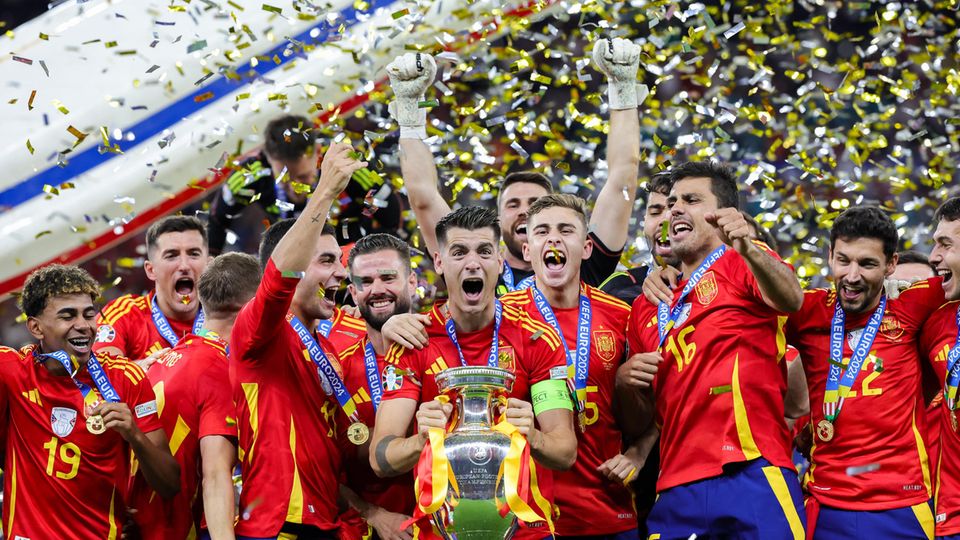Cynical result-oriented football, wrong referee calls: It was hard to love this European Championship. All the better that Spain’s title win brought a conciliatory ending.
When Alvaro Morata lifted the silver trophy, weighing eight kilos and more than half a meter tall, into the Berlin night sky, it was the moment when the tournament was given justice. It was the moment that wiped out everything that had built up over the past four weeks of the European Championship.
The feeling that football has no heart, that it rewards the wrong people: the French, who cheated their way into the semi-finals by taking penalties and scoring their opponents’ own goals. The English, also rich in talent, who only focused on destruction and even made it further, to the final. And then there were the many questionable referee decisions. The penalty for Germany against Denmark, which wasn’t one. The handball by Marc Cucurella against Germany, which should have been one. The stoppage time in the England against Slovakia match, which was far too long and only ended when Jude Bellingham scored the equaliser for England.
Spain defeats England in the European Championship final – all highlights in the video
06:00 min
Never before have football matches been measured so precisely, scanned so elaborately with sensors and modelled by artificial intelligence as at this European Championship. And never before has the feeling been so great that something is rotten in the state of UEFA.
Spain’s Morata in the rain of gold
And then everything turns out well in the end. Morata with the trophy on the podium, in a shower of gold pieces. Above him, like a glittering crown, the sparks of the fireworks. This was the celebration of the victory against England, 2-1 after goals from Nico Williams and Mikel Oyarzabal. The first title win for Spain since 2012.
It is a well-deserved title because it is not only a reward for winning the final, but also an award for the best performances during the entire European Championship. Spain’s triumph is a plaster on the thousand little wounds that this tournament has caused for everyone who loves football.
Who hadn’t the Spanish beaten? Italy and Croatia in the group stage, Germany in the quarter-finals, France in the semi-finals. All big names, and Spain had been the better team in every game. And of course they were the better team on Sunday against England.
In this match, everything that had made the Spanish team so irresistible recently was condensed once again. However, it took them more than half a game to find their usual class. It was only Williams’ goal in the 47th minute that brought the art back into their game. It seemed as if the Spaniards needed to remind themselves that they are an attacking team: Dani Carvajal with the outside of his foot to Lamine Yamal; Yamal to the other side to Williams – and he pushes the ball in flat.
The youngest represent the new maturity
A scene like a best-of clip of the Spanish game. With Yamal and Williams in the lead roles, as the most exciting wing duo of the European Championship. Two highly talented players who made the tournament theirs at an early age, one just 17 years old, the other 22.
It is a nice twist that the two youngest players represent the astonishing maturity of Spanish football.
This has emancipated itself from the Tiki-Taka of the Xavi and Iniesta era, the short passing game for which FC Barcelona was admired around the world in the 2000s and which also shaped the style of the national team. Between 2006 and 2012, the Spanish won three titles in four years, including the 2010 World Cup. After that, however, Tiki-Taka became the epitome of a game that can still be intoxicated by itself at times but brings little. The age of counter-pressing had begun; a plain system trimmed for efficiency.
But Spain just carried on, travelling from tournament to tournament as a reference to itself. What was right yesterday couldn’t be wrong today, could it?
The failure at the 2002 World Cup as a turning point
Yes, that was it. At the 2018 World Cup, they were eliminated in the round of 16, as was the case at the 2022 World Cup, and only the failure in Qatar was to be the turning point. Coach Luis Enrique was sacked; he too was a preacher of possession football, with a Barca past of course.
Luis de la Fuente, then 61, who had previously coached the Spanish Olympic team and several junior teams, came in. He had no great coaching background, was not a peacock like Enrique, just a sober person. De la Fuente left the national team the tika-taka, but he enriched it with powerful wing play and a robust defense. This was also why Spain was so difficult for England to get a grip on on Sunday evening, as it constantly changed its game. Sometimes possession football through the center, then attacks down the wings, occasionally retreating to its own penalty area – including knocking balls away. It was unthinkable just a few years ago to desecrate the Spanish game like this.
Fortunately, these moments were rare in the final. Spain’s victory was a victory of beauty over the minimalist football of the English. Captain Harry Kane’s team did not want to contribute anything to the game, they waited for the opponent to lose the ball, and only when they were 1-0 down did they dare to attack.
A collective in which the individual can shine
Spain, on the other hand, is a collective in which the individual is allowed to shine. No systemic pressure like in England, no football socialism that keeps everyone in line, even great talents like Bellingham, Foden and Kane.
England’s defeat is a win for football. This model will not become the norm, which would have been feared if they had been successful. The industry often makes things easy for itself. The rule is: whoever wins is right. And then everything is quickly reinterpreted: poor play is interpreted as a reduction to the essentials, lucky victories serve as proof of cleverness, and so on. The wrong becomes the right. This was also observed at this European Championship, see France, see England.
Spain has now shown football a different path. A beautiful, artistic one. Luis de la Fuente, certainly not a man of exuberance, seemed to sense that he had achieved something great – perhaps something that would define his style. “Viva España!” he shouted into the microphone when he had finished his press conference long after midnight.
Spanish football is alive again. This is good news for the sport.
Source: Stern
I am Pierce Boyd, a driven and ambitious professional working in the news industry. I have been writing for 24 Hours Worlds for over five years, specializing in sports section coverage. During my tenure at the publication, I have built an impressive portfolio of articles that has earned me a reputation as an experienced journalist and content creator.




